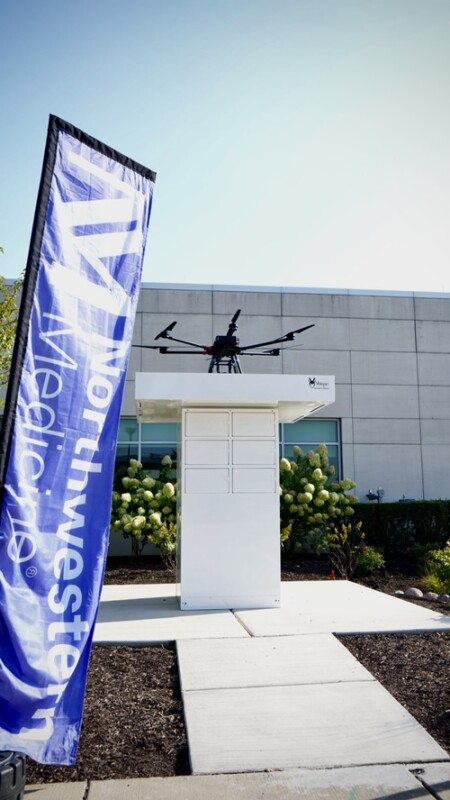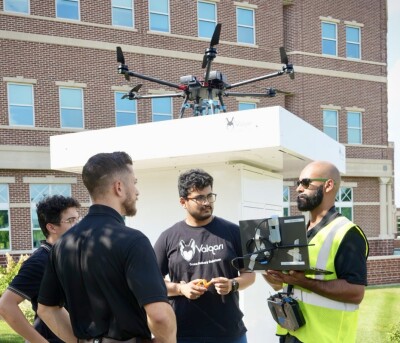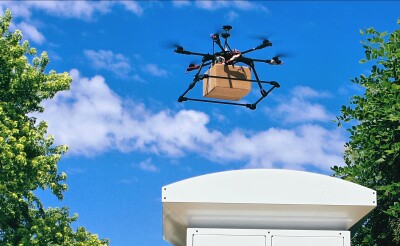GENEVA, IL - Northwestern Medicine is teaming up with Lombard-based Valqari to test drone deliveries on the campus of Northwestern Medicine Delnor Hospital.  The pilot-project is the first step in determining the feasibility of using drone technology for safe and efficient deliveries of specimens and medical supplies. Northwestern Medicine Delnor is among the first hospitals in the United States to trial drones for inter-site deliveries.
The pilot-project is the first step in determining the feasibility of using drone technology for safe and efficient deliveries of specimens and medical supplies. Northwestern Medicine Delnor is among the first hospitals in the United States to trial drones for inter-site deliveries.
Lab testing capabilities vary across Northwestern Medicine’s campuses and often require blood samples to be sent to different lab locations. These deliveries affect turnaround time for results and can delay care.
“Traditionally, this type of delivery has been done through hired courier services or clinicians walking the specimens across the campus on a set schedule,” said Sylvester Dazzo, vice president of administration at Northwestern Medicine. “If proven feasible, drone delivery has the potential to create an on-demand option that doesn’t require staff to walk across campus, keeping our caregivers doing what they do best – providing world-class patient care.”
The drones currently fly between Delnor Hospital’s south entrance and the cancer center across the street from two drone stations. It flies over the grass lawn and walkways and crosses the street and sidewalks when no people or cars are nearby. While the drone flies entirely on its own, a pilot is nearby to supervise the drone flight.
"We have a significant number of patients who require same-day blood product transfusions who have benefited from the service the drone is providing,” said Megha Shah, RN, oncology infusion charge nurse at the Delnor Cancer Center. “It allows us to obtain our blood products outside our scheduled courier times - significantly reducing wait times for patients.”
Operations of the drone are overseen by Valqari, a recognized leader in drone deliveries headquartered just down the street from Delnor’s Geneva campus. Every morning before drone flights commence, Valqari’s team secures Federal Aviation Administration (FAA) approval to fly for the day. No patient information is visible to the flight team at any point during the delivery process. The drones are not equipped with cameras.
“When ready for transport, hospital staff makes an on-demand delivery request with Valqari’s app notifying the flight team of an inbound package,” explained Ryan Walsh, CEO and founder of Valqari. “The package is placed in a designated locker on the nearest Valqari DronePort and is then loaded onto an elevator that attaches the package to the drone. The drone ensures the airspace is clear before taking off then flies to the designated landing station to drop it off. An FAA-certified Part 107 pilot is within line of sight that can take over the controls at all times to ensure we are always meeting the current FAA requirements."
Without drones, most deliveries on the Delnor campus are made during four scheduled courier trips each day. For an on-demand delivery, staff walk the items out of the building and across the street something that occurs 40+ times per month.
"Prior to the drones, nursing staff walked back and forth between the cancer center and hospital sometimes several times per day,” said Kristen Goldsmith, RN, oncology infusion nurse at the Delnor Cancer Center. “Having the drones make deliveries helps because it keeps me at the chairside with my patients. In the cancer center, treatment decisions are based on bloodwork, so with this on-demand option, we are able to expedite care, and the quicker turnaround time takes some stress off our patients who are anxiously awaiting their results."
Current FAA guidelines require drones to operate within a line of sight, have 20 ft radius of open space around it, and to remain on the Delnor campus. Drones cannot operate within the city of Chicago or within five miles of an airport. However, drone regulations are expected to expand in 2025 opening the opportunity to further the use of drone deliveries to other sites in the Northwestern Medicine Health Network.
“If this project continues to validate drones as a safe and quick delivery option, we’ll explore where else in the health system drones may be beneficial,” said Dazzo. “We are particularly interested in how drones can potentially improve treatment times at our rural locations by providing a fast, efficient delivery option where one doesn’t currently exist.”
For Valqari, partnerships like the one with Northwestern Medicine present an opportunity to develop and refine solutions that drive innovation and efficiency in the field of drone deliveries.
"We are grateful to be able to work towards our company mission, which is to use our technology to improve people's lives,” said Walsh. “Getting the opportunity to do that alongside such an amazing company as Northwestern Medicine to be able to improve patient treatment times is a big step in our mission. Our collective efforts are instrumental in shaping the future of drone delivery, ensuring that this transformative technology evolves to meet the demands of a dynamic landscape.”
Northwestern Medicine is committed to rapidly finding, evaluating and activating internal and external innovative solutions for challenges affecting patients and care teams today and to optimize future care delivery. The Northwestern Medicine Mansueto Innovation Institute connects innovators and collaborators to an extensive network of leaders with expertise in medicine, innovation, data, business and more within Northwestern Medicine and across the healthcare industry. To learn more, visit the Mansueto Innovation Institute website.
Source: Northwestern Medicine
















Comments